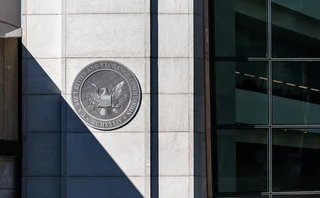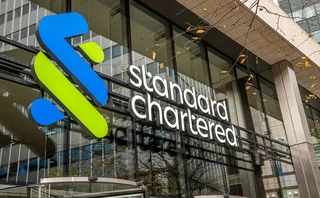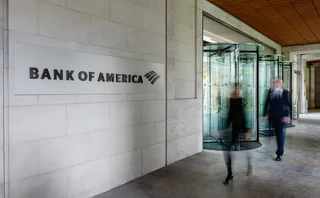
Arbiter of arbitrage
During the past three decades, Brian Stark has evolved from being a high school trader into the co-founder of a seminal hedge fund.

During the second half of its existence, the fund manager has evolved from being focused on convertible and risk arbitrage to become a multi-strategy investor. Its performance is consistently strong. According to an independent hedge fund performance database, Stark Investments’ flagship domestic fund posted a return of around 16% in 2003.
One strategy the fund has become more involved in recently is distressed investment. But it is arbitrage that continues to be central to the enterprise – as evidenced by Stark’s launch of a dedicated Asian multi-strategy arbitrage fund in November 2003. The fund is expected to reach a size of $100 million by the end of first-quarter 2004.
Stark’s first enterprise was somewhat different in scale, but not spirit. He and his father, Henry, formed a family partnership in 1973. His first arbitrage trade involved the warrants and stock of drug company Alza, in March 1975. For every stock bought at $18.25, he sold three warrants short for $4.75; their exercise price was $25, and they expired in April 1976. The stock could rise 94% or fall 78%, and anywhere within this range would turn a profit. “The majority of what we do now [at Stark Investments] is not that different,” says Stark. “We look for complex, or ignored, opportunities and set up market-insensitive, attractive, risk-reward plays on a portfolio basis,” he adds.
After high school, he continued to research and invest in warrant arbitrage during his subsequent time in academia. He studied political science and economics at Brown University, before attending Harvard Law School, where he found time to write a book in-between his studies. Entitled Special Situation Investing: Hedging, Arbitrage and Liquidation, the book was eventually published in 1983. By this time, Stark was a practising lawyer, though he continued to invest on the side. His opus didn’t exactly jump off bookshops’ shelves. “Compared with the level of mathematical sophistication you now find, it is quite basic. But in its day, it was relatively technical, so the potential readership was small,” he says.
The young lawyer was feeling unsettled. “To be more systematic and exploit opportunities in a more significant way, I needed to go into money management full-time,” he says. So, in 1986, he started a hedge fund called Stark Partners. He was the first in-house manager for an early fund-of-hedge-funds manager; he declines to disclose the firm’s identity to Risk. Within six years, Stark Partners was managing around $400 million worth of assets – a combination of its role for the fund-of-funds and another mandate.
Change
But by the end of 1992, it was time for another change. Stark, alongside his colleague Mike Roth, decided to move on and co-found a new shop: Stark Investments. Stark and Roth had been friends since their days at the Harvard Law School. Before coming to work with Stark in early 1988, Roth was a litigator in Washington DC, specialising in antitrust and regulatory issues. “I had no prior investment experience. He trained me and taught me everything I know,” Roth says of Stark.
Their beginnings were humble – running the nascent fund from a room in Stark’s house in Old Greenwich. But within a short time they’d reached the $100 million mark. They moved the firm back to their home territory in Wisconsin, where it continues to be located.
Things have changed since the early days: the team has grown from a handful to the current head count of 130. “My strategy has remained consistent though. We’ve diversified to include non-arbitrage strategies in recent years, but a market-neutral orientation is ever present in our investment decisions,” Stark says.
At the core of Stark’s style is an ability to find opportunities that arise out of persistent market inefficiencies. A classic example arose in Japan in the late 1980s. While many other managers were confining themselves to the US market, Stark – alongside a few others – realised Japanese warrants were being mis-priced. Investors were using the warrants as pure bets, and not valuing them within an option-theoretic framework. “It was possible to create very cheap puts [synthetically] through short selling,” says Stark. “Hedgers were able to make a lot of money when the market periodically dipped,” he adds.
Stark has only had one year when he posted an annual loss since he began investing. “It was 1998, and it was a painful year, but it also demonstrated that crises are often an opportunity. Our holdings in this difficult time ultimately performed extremely well,” he says.
His positive outlook even extends to controversies that now loom large in the hedge fund industry. “It’s making all funds take a closer look at compliance and control, and prompting more openness.” According to Stark, his firm was “non-transparent” in the early years, but has become more open in recent years. “You must change with the times. There are ways to disclose without threatening your strategies’ success,” he says.
Only users who have a paid subscription or are part of a corporate subscription are able to print or copy content.
To access these options, along with all other subscription benefits, please contact info@risk.net or view our subscription options here: http://subscriptions.risk.net/subscribe
You are currently unable to print this content. Please contact info@risk.net to find out more.
You are currently unable to copy this content. Please contact info@risk.net to find out more.
Copyright Infopro Digital Limited. All rights reserved.
As outlined in our terms and conditions, https://www.infopro-digital.com/terms-and-conditions/subscriptions/ (point 2.4), printing is limited to a single copy.
If you would like to purchase additional rights please email info@risk.net
Copyright Infopro Digital Limited. All rights reserved.
You may share this content using our article tools. As outlined in our terms and conditions, https://www.infopro-digital.com/terms-and-conditions/subscriptions/ (clause 2.4), an Authorised User may only make one copy of the materials for their own personal use. You must also comply with the restrictions in clause 2.5.
If you would like to purchase additional rights please email info@risk.net
More on People
People: You’re fired! US agency rejig, new CROs at ING, StanChart, and more
Latest job changes across the industry
SocGen’s PB clearing head departs for SwapAgent role
Jamie Gavin takes external consulting role for LSEG’s non-cleared swaps platform
Robertson leaves Barclays’ prime services in New York
Head of prime derivatives services unit departs after seven years with the bank for Carbon Point
Citadel Securities hires former Eisler CRO
Pregnell joins market-maker after demise of hedge fund
People: Fishwick hands over BlackRock CRO role, Citi expands Asia FX team, and more
Latest job changes across the industry
Nomura shuffles risk methodology team
Epperlein takes advisory role six months after Japanese bank’s FRTB IMA go-live
Andy Ross leaves StanChart
CurveGlobal veteran confirms his departure as bank’s global head of prime brokerage
People: BofA’s new markets heads, Barclays takes SG’s Mastrangelo, and more
Latest job changes across the industry







